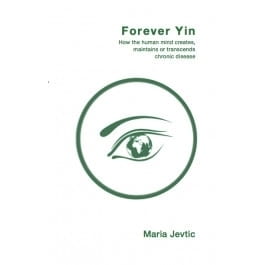HOW THE HUMAN MIND CREATES, MAINTAINS OR TRANSCENDS CHRONIC DISEASE
As a final instalment, after From Cave to Computer and The Poisoned Well, and forming the last part of a trilogy, this book takes us on a journey into the mind. Considering the human mind as the pinnacle of natural evolution, we have long been intrigued by not only its existence per se but also by its ability to shape a person's life for better and worse. In what way our mind is involved in producing chronic disease and which options are available to us to reverse the process are the main questions this book attempts to answer.
Sometimes it takes a completely fresh look and a daringly novel approach relatively unrestricted by convention and prejudice in order to find those answers many of us might be waiting for. One thing is certain, in the question of aetiology of chronic disease, after unravelling all the biological, nutritional and environmental factors that make us sick, we arrive where the buck stops: in the human mind. It is here where natural evolution installed the most marvellous playground - a virtual space which we can use to create our own future, in sickness or in health.
There is much to be found here, much wonder and magic, and the most liberating insight is perhaps the most trivial of all: the only thing that can ever hold us back is a lack of imagination. The human mind is a creative instrument of marvellous dimensions.
- Author: Maria Jevtic
- ISBN: 9781874581741
- 352 pages
- Edition: First
- Paperback
- Published in 2018
- Printed in United Kingdom
Reprinted with the permission of The ARH (from the Journal 'Homeopathy in Practice', Summer/Autumn 2018 edition). Reviewed by Elizabeth Adalian, MARH.
This is the third part of a trilogy and focuses on the mind, as indicated in the subtitle of the book. Maria Jevtic is a homeopath but, when reading it, I recognised an anthropological approach to the subject. In fact, it represents an indictment on the influence of the modern world on the increasing state of mental disease in the world at large.
The author's writing style, which I found quite abrasive and agenda driven, created some resistance in me. However, when I persevered, the primary message became apparent - although it was only two-thirds of the way through the book that it came home to me in the following statement:
"Part of the answer is that not many people have truly understood the dilemma we are in and how it is related to our varying symptoms of dis-ease and, further, how this is related to the dis-ease our existence on this earth is subject to. How many people realise how all our problems are down to separation?"
I interpret this as reinforcing the whole concept of isolation, which is such an issue in today's society, as well as the danger of dualistic thinking. The problem is that we have lost tribal culture which would take care of loneliness as there was always someone to reach out to in those times. I speculate that one only has to think of a remedy such as Anacardium (which represents 'split') having such deleterious effects on the individual in their role in society. Finding the balance is a major theme in this book, as revealed in the whole emphasis on Yin in the light of Yang and its predominant emergence in today's culture. She covers many philosophies including Chinese and Hindu in the context of the theme of separation. There is a playful aspect, when she quotes the whole of the song The Windmills of the Mind as a way of bringing home the message of unity.
Jevtic makes a correlation between the advance of technology and the environmental catastrophe which is being played out in front of our eyes. She points out that we turn our back on Nature at our very evident peril if we think we can actually take charge. She tells us 'hunter gatherers literally lived in paradise and could have remained there happily - had it not been for the human mind'. Another message is that children nowadays cannot wander far for fear of strangers and other dangers. Creativity is being quelled by city living and the influence of the internet culture - she reminds her readers how vital creativity is to the survival of the species, in her eyes. She discusses the role of cortisol comprehensively and in great detail, and makes an association between the destruction of Nature and the rise in the production of plastics and xenooestrogens as well as hormonal contraceptives.
Jevtic alludes to the subject of psycho-endoneuroimmunology (PENI) in the context of negative mental states leading to physical disease. This is a highly topical area and will be of interest to homeopaths. She mentions primal triggers creating similar emotional states as the subject moves through life. To contextualise this, the expression 'experiences become expectations' becomes the mantra. After all, priming is so engrained in each and every one of us. She points out that there has been so much setback in this context influenced by the effects of two world wars when chaos disrupted the development of society in its individuation, and explains how priming works so differently for the male and the female of our species.
In conclusion, this last book in the trilogy completes a subject which very much fits the zeitgeist at a critical time in our history.

